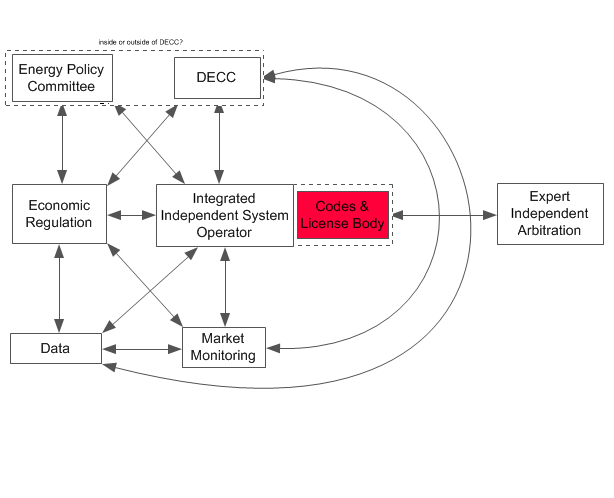Fit-for-purpose GB Energy Governance – what is it? and what to call it – DEG or OBR?
Catherine Mitchell, IGov Team, 13th October 2015
IGov published a Working Paper in March 2015 called Public Value Energy Governance: establishing an institutional framework which better fits a sustainable, secure and affordable energy system which included a ‘straw’ model for a restructured institutional framework for a GB Governance system. We suggest this framework is fit for purpose, as opposed to the current governance system which is not. Governance is here taken to mean the policies, institutions, rules and incentives of the energy system, and the process of decision-making behind them.
The straw model argues that there are three fundamental issues of our current regulatory process which needs to be dealt with:
- the lack of legitimacy within our energy policy process which leads to an increasing separation between the policy wishes of Government / the energy industry incumbents and with society (for example, support for nuclear and fracking as opposed to solar or energy efficiency measures)
- the lack of nimbleness in its decision-making, which means that there is a gap between the removal of regulatory barriers and technology take-up, so that practice change is slow; and
- the way that its rules and incentives suits the characteristics of fossil and nuclear technologies and business practices, thereby undermining new business models and competition and perpetuating the current system and current ways of thinking
The name – PVEG was universally disliked. There were also questions about whether our straw model was better at ensuring policy legitimacy within the short term, first-past-the-post electoral process of British politics.
This blog introduces a re-worked institutional governance framework based on issues raised during ongoing IGov work, as another ‘straw’ model, to take the debate in GB further. It does not include a discussion of the vital details of governance, for example, market rules, how to regulate networks, overcoming inertia, strategy and policy statements, and so on. Please read the Change and Inertia and PVEG Working Papers for more details.
We place the responsibility for energy (and climate) policy on the Minister in DECC. The decisions taken by that Minister have to be agreed, via legislation, in Parliament. Decisions on which technology pathways to follow; the rate of emission reduction; within what infrastructure; and with what ownership have huge distributional impacts on GB society. Such broad decisions which have such distributional impacts should be taken by our elected representatives. The Minister in DECC may choose appropriate policies, following advice and the policy- making process undertaken by the energy policy committee below.
The issue then is that decisions on technology pathways, infrastructure and so on are very long term decisions but our elected representatives change every 5 years. Also our political system, unlike for example the Danish one, finds it difficult to organize long term consensus.
We suggest an energy policy committee (EPC) – somewhat analogous to the monetary policy committee in the Bank of England – which is responsible for both ensuring the execution of government energy policy via strategy and policy statements (SPSs) but also, crucially, advising the Minister on energy policy decisions. We see this EPC made up of committee members and staff, in some ways rather like the public utility commissions or public service boards of the US. Each State in the US has a PUC or a PSB and they usually have 3 or 5 commissioners for 3 to 5 years, who come on to the Commission at different times, and who are appointed under different rules in different States – some of which are legitimate and some of which are not. We support a legitimate, merit based appointment system for committee members.
We also see the EPC as being responsible for ensuring the GB debate about energy policy development is deep, and legitimate and includes all stakeholders. This would mean that it should also include politicians. As mentioned above, one of the issues in GB energy policy is that political consensus is hard to come by and there are few mechanisms which allow inclusion and trust to build up between stakeholders, including different political parties. One negative aspect of this is that energy and environment policy is used as a political football, in part because political parties recognize how important energy and climate change is to society, and for individuals / households within it. However, the energy system is particularly long lived – and is also very highly capitalized – so it is important that some form of consensus is achieved so that poor investment decisions with long lifetimes are not made. GB needs to develop an energy policy process where long term decisions can be made with (more) societal and cross-party political consensus manner, so that decisions in one parliament are less likely to be ripped up in the next.
At root, this requires ‘credible’ ‘legitimate’ decisions to be made. It is of no help to society that decisions are made that either cannot be followed through with (i.e. those that lack credibility as with the current nuclear programme) or which are deeply unpopular (as with shale gas). A key role for the EPC would be to build up that inclusion and trust amongst stakeholders – and in this sense, we have modelled the EPC on the Danish Energy Agency, which is inside the Danish Ministry. Please see a recent Working Paper on that for more details. The EPC therefore needs to have the capacity to be able to execute, advise and legitimize energy policy but not devise policy – because that is the responsibility of the Minister. A decision has to be taken on whether it is inside DECC or not.
We have established Strategy and Policy Statements between the institutions so that while their individual roles may differ, they all have the same goals. Ultimately, the Minister gives authority to the EPC to execute energy policy. There are SPSs between DECC, the EPC and all the institutions. The current model of SPS leaves Ofgem to handle the trade-offs, which leaves too much of the political aspects of energy in their hands. The EPC would be handling the political aspects of policy decisions, including trade-offs, which would be the basis of advice to the Minister. The EPC would have hierarchy over the economic regulator and the Integrated, Independent System Operator (IISO). This implies that the SPS between DECC and the ECC needs to establish clarity over aims, goals, mission and so on of the EPC.
We see the economic regulator, undertaking economic analyses and executing network regulation. We have modelled this economic regulator on the Danish Energy Regulator. This is a rebalancing of the current energy institutions so that the economic regulator and the Integrated Independent System Operator (IISO) are on the same level, both working to the EPC.
The IISO would be State-owned, not-for-profit. It would take what is now the system operator function within National Grid, and renationalise it, but add to its functions. It would be on the same ‘level’ as the economic regulator, and would be responsible for balancing, system security and for the technical transformation of the energy system in order to meet the 80% cuts of carbon by 2050. This IISO is not a transmission system operator, nor a distribution system operator. It is an IISO to enable a secure and integrated energy system of electricity, heat, transport. Its role is a balancer and market facilitator which integrates the local with the regional (i.e. European) networks. It should remove unhelpful separation of distribution from transmission. It should have the technical capacity to operate the system. It should complement distribution network operators – particularly if they can be turned in distribution service providers i.e. local energy markets at the heart of the energy system. The market rules and incentives to ensure efficient integration are a vital complementary part of this and the IISO should therefore be aware of technological changes elsewhere and should keep-up-to-date with how governance is shifting to account for and accommodate these changes. The IISO is therefore a new role and institution to provide the technical capacity to transform the energy system.
We have placed a Codes and Licenses Body (CLB) within the IISO. The current governance of Codes and Licenses needs root and branch restructuring – both with respect to text, process and institutions. Since the IISO is responsible for transforming the energy system, it is best placed to know what Code and Licenses are required, and what changes will be needed at what time given new technological developments, practice change or social preferences. In order that there is a checks and balance process an Expert Independent Arbitration body is available to review decisions by the Codes and Licenses Body.
Other institutions are also needed and will have SPSs – for example a data body, a market monitoring body, a consumer commissioner and so on.
IGov welcomes any comments on this.
What to call it?
The energy system is decentralising – whether in terms of technologies, ownership, business models, local authority involvement, social preferences. In that sense, the type of energy governance required is one suitable for a decentralised energy system – i.e. decentralised energy governance.
Alternatively, one can think of the energy system being directed towards certain outcomes – greater decarbonisation; greater optimisation in terms of increased energy efficiency and improved integration; improved flexibility; more legitimacy; and focused on more public interest. In this sense, it could be outcome based regulation. This is somewhat different from the Principles Based Regulation which is endeavouring to move away from transactional letter-of-the-law attitude to regulation towards meeting the ‘spirit’ of the intention of the regulation. We support this but consider it is not sufficient. Practices have to change.
Related Posts
« Previous Presentation: Tomorrow’s Utilities – what future? New Thinking: Progressive Regulation – What Future For Ofgem? Next »










One Response to: New Thinking: Fit-for-purpose GB Energy Governance